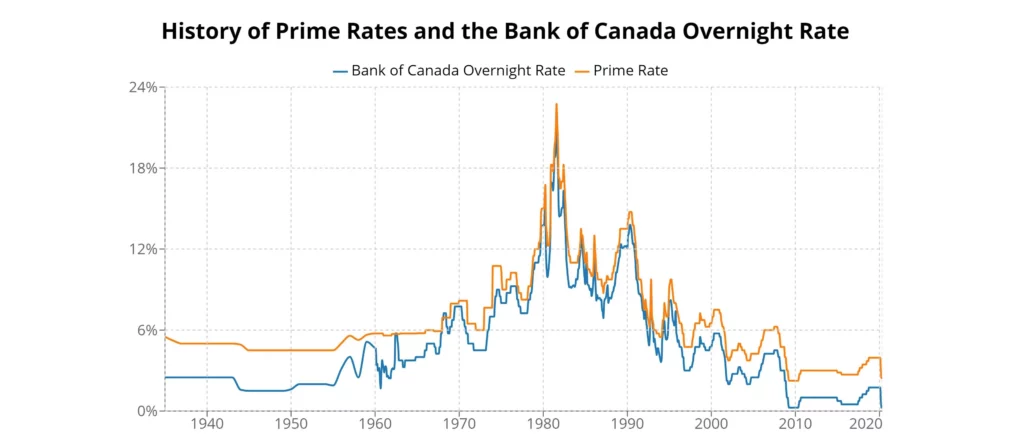Should you pay down your mortgage early when interest rates are high?
Buying a home is one of the most significant financial decisions you may make in your lifetime, and your mortgage strategy will determine the outcome. Your mortgage is a long-term commitment, and one common decision homeowners are faced with is whether to prioritize paying down their mortgage early or investing extra capital elsewhere.
We’ve talked previously about the decision to pay off your mortgage as early as possible versus investing for retirement, and when crunching the numbers it turns out that it’s often the better plan financially to invest for retirement. Your mortgage is likely one of the cheapest forms of debt you have available and taking advantage of this leverage can result in increasing your net worth faster than what would be possible without it.
Key takeaways
- While interest rates have risen rapidly over the past 2 years, 5.00% is lower than average over the Bank of Canada’s history.
- The decision to pay down your mortgage or invest for retirement is a function of your current interest rate and your expected return on investments.
- Whether the current policy interest rate is historically above average or not is not as important as taking into consideration your current mortgage rate and comparing it with your other financial options.
Recommended reading: Should you pay off your mortgage or invest for retirement?
With interest rates on the rise over the past year, the question is still top of mind for many mortgage holders. How does this decision change during times when interest rates are high and mortgage costs are climbing? At what point does it become the right move to pay down your mortgage rather than invest?
What counts as a “high interest rate”
First of all, we need to make a distinction here. Of course if interest rates were 0 it would be a no-brainer to borrow money and invest it, but from the scale of 0.01% to infinity where should we draw the line to define a “high” interest rate. To answer this question let’s take a look at the history of the bank rate in Canada.
The history of interest rates in Canada
According to Stats Canada, since 1935 the highest the overnight rate has ever been was 17.93% in 1981. The lowest the overnight rate has ever been set was 0.25% which occurred for the first time just recently in March 2020. The policy interest rate remained at that level for 2 years until the Bank of Canada began to raise interest rates in March 2022 in response to high inflation. Since 1990 the key interest rate has averaged around 5.78%. As of the writing of this article the current overnight rate sits at 5.00%. With these numbers in mind, it doesn’t seem accurate to say that interest rates as they currently stand are extraordinarily high. Some mortgage holders may still be concerned about future rate hikes but unfortunately no one has a crystal ball when it comes to the future of the economy or the Bank of Canada’s decisions. Ultimately whether you predict that rates are likely to increase, stay where they are, or fall in the future, the decision whether to pay down debts as fast as possible should be made based on factors other than the historical average interest rate.

It doesn’t matter whether rates are “high” or not.
While arguments can be made for or against current interest rates being high or low, unsustainable or not for the average homeowner, this is ultimately irrelevant to your decision of whether to prioritize paying down your mortgage as fast as possible.
The decision of whether to pay down your mortgage or save your money for other uses such as investing should be based on the following factors:
– The current cost of borrowing
– Your expected rate of return on investing
– Your personal risk tolerance
– The expected decay of debt
– Your current financial situation
These are the same factors that you likely have taken into account when determining whether to get a mortgage in the first place. It is always an option to purchase a home in cash, however many don’t have the option to do so, or more often have determined it to be the most optimal financial move to borrow money to finance their home.
00,000 of which 50% becomes taxable income. In this case you would have made a profit of $100,000 from your investment, and report $50,000 worth of taxable income on your tax return for the year.
The cost of borrowing
Whether the current policy interest rate is historically above average or not is not as important as taking into consideration your current mortgage rate and comparing it with your other financial options. If you have a variable rate and are concerned that mortgage rates are likely to keep rising past your ability to budget for it, then you will likely want to pay your mortgage down quicker.
Your expected rate of return on investments
The decision to pay off your debts or invest is a simple calculation that involves subtracting your cost of debt from your expected rate of return. If you can invest and earn a guaranteed 5% rate of return, then borrowing at an interest rate of 4% is advisable. Unfortunately, not all investments are guaranteed which is why investors usually use an “expected” rate of return when evaluating assets.
Your personal risk tolerance
Tying back into your expected return on investments, we have your risk tolerance which will determine what kind of assets you invest in and how much leverage you are comfortable with using. The most risk-taking of us may consider taking on multiple mortgages, leveraging existing equity to build up a portfolio of real estate, while those of us who are risk-averse may not have taken on a mortgage in the first place, or only do so out of necessity to access capital rather than as a planned financial strategy. Some homeowners value the peace of mind that comes with a paid-off mortgage, and while it may not be mathematically the optimal decision to maximize net-worth, that’s for everyone to decide for themselves.
The expected decay of debt
Another common reason investors use debt financing is because the current western economic mode of operation involves ever present inflation which causes debt to decay over time.
Debt decay refers to the cumulative effect of annual inflation which devalues the dollar.
$100,000 borrowed today will not have the same financial impact as that same $100,000 debt in a few decades. With a consistent 2% rate of inflation, your debt is halved in real terms every 35 years.
Your current financial situation
Lastly, your current financial situation plays the biggest role in your decision to pay down your mortgage early or not. Homeowners struggling to pay their mortgage may not have the option to increase their mortgage payments, while those who can afford their mortgage at current rates but are worried about being stretched thin should rates go higher may prefer to pay down their mortgage now to lessen the impact of future rate hikes on their monthly budget.
Perch is your digital mortgage brokerage, offering you the opportunity to search and compare mortgages, then get pre-approved in as little as 20 minutes. Think of us as Google Flights, but for your mortgage.
When you sign-up to Perch you get instant access to our Pathfinder tool, which will show you mortgage options from dozens of lenders.
Our mortgage advisors have years of experience in the mortgage industry, and can help you choose the best mortgage for your situation, so you don’t have to worry about leaving money on the table.







